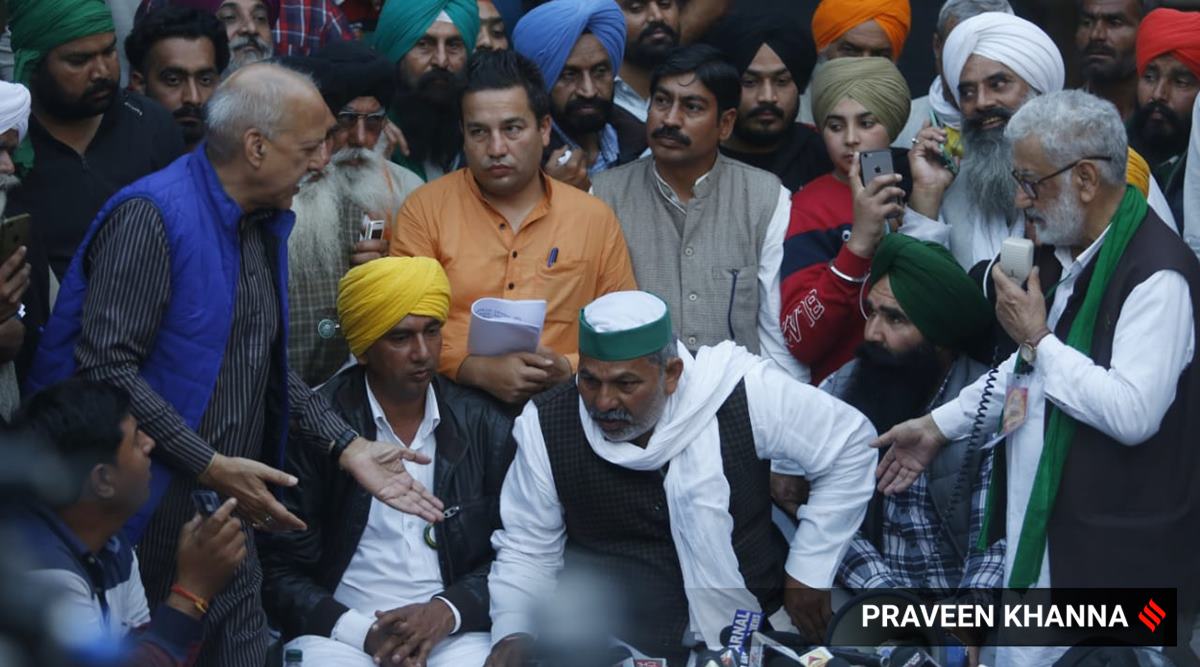 Farmer unions at a press conference at Singhu Border. (Express Photo by Praveen Khanna)
Farmer unions at a press conference at Singhu Border. (Express Photo by Praveen Khanna)The Centre Wednesday offered significant concessions, ranging from a written assurance on continuation of minimum support price (MSP)-based procurement and ensuring parity in transactions inside and outside existing Agricultural Produce Market Committee (APMC) mandis, to farmers protesting against the three new agricultural laws. However, the farmer unions rejected the proposals, several of which will require amending two of the new laws, as the government said.
The 20-page proposals, by the Ministry of Agriculture and Farmers’ Welfare, were forwarded to the farmer leaders around 2.30 pm, and included a written assurance on MSP. The move came a day after Home Minister Amit Shah met 13 representatives of the unions protesting against the farm laws.
“Kendra sarkar MSP ki vartamaan kharidi vyavastha ke sambandh mein likhit aashvaasan degi (The Central government will give a written assurance regarding the existing MSP-based procurement system),” the note said.
Since the new laws make no mention of the MSP, it is not clear whether the written assurance will be provided through an amendment or an executive order. The government has repeatedly assured that the laws would make no changes to the MSP system, but the farmers fear these will effectively lead to abolition of the prevailing arrangement, which offers them a modicum of security.
On apprehensions that the Farmers’ Produce Trade and Commerce (Promotion and Facilitation) Act, 2020, or FPTC Act — one of the three contentious laws — will weaken the mandi system, the government has proposed to tax transactions outside the APMC mandis as well, saying states will be authorised to make appropriate regulations to ensure this.
“By amending the Act, it can be provided that the state government can implement the system of registration of private mandis. Also, the state government can fix the rate of cess / fee, to be collected from such mandis, up to the rate of cess / fee applicable to the existing APMC mandis,” say the proposals.
The farmers have been saying that the absence of such a fee would encourage trade outside mandis, eventually rendering them insignificant.
All purchases of paddy and wheat undertaken through government-regulated mandis in Punjab currently attract 3 per cent APMC market fee and 3 per cent rural development cess. In Haryana, the same levies amount to 2 per cent each. As of now, Section 6 of the FPTC Act, 2020, states that no market fee or cess or levy, by whatever name it is called, under any state APMC Act or any other state law, shall be levied on any farmer or trader or electronic trading and transaction platform for trade and commerce in scheduled farmers’ produce in a “trade area”.
The government has also assured farmers that states will be authorised to register private traders, so that they do not cheat farmers. The states can be empowered to make the rules under the FPTC Act, 2020, say the proposals.
In case of a dispute, the Centre has further assured, farmers may approach civil courts, a provision absent from the newly promulgated ordinances. Section 15 of the FPTC Act, 2020, and Section 19 of the Farmers (Empowerment and Protection) Agreement on Price Assurance and Farm Services Act, 2020, put a bar on jurisdiction of civil courts and say disputes have to be referred to conciliation boards and appellate authorities, appointed by the local sub-divisional magistrates and district collectors.
The proposals sent on Wednesday say, “If any dispute arises under the new farm laws, farmers can be allowed to approach civil court.”
Incidentally, while the government has talked of amending these two farm laws, it has not proposed any change in the third one, Essential Commodities (Amendment) Act, 2020.
The other assurances made by the Centre include resolution of grievances related to a new air quality management ordinance, which calls for steep penalty in case of stubble burning. “Appropriate solution will be found in this regard,” the Centre has said.
It has also said that the existing arrangement on subsidy on electricity usage by farmers will not be modified.
The last five rounds of talks between the government and farmers have remained inconclusive, with the latter taking a maximalist position and demanding complete repeal of the new laws, rejecting the government’s offer to reconsider some of the key provisions.
At the fourth meeting, Agriculture Minister Narendra Singh Tomar was learnt to have offered to amend some provisions of the farm laws and even agreed to give a written assurance on MSP and procurement, but representatives of the farmer unions had spurned the offer.
On Wednesday, after the farmer unions rejected the government’s proposal, Tomar met Shah. There was no official statement on what transpired at the meeting.